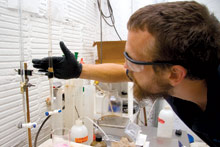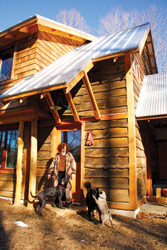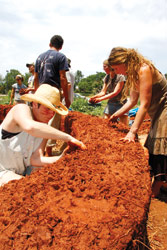Question: What do the Southern Energy and Environment Expo and President George Bush have in common? Answer: They’ve both been around for eight years.
The S.E.E. Expo draws thousands of environmentalists to the Western North Carolina Agricultural Center annually to learn about sustainable technology and green living. But to hear founder/organizer Ned Doyle tell it, it’s been tough sledding for the environmental movement and clean-energy advocates under the current administration.

“The upshot of the last eight years—the one silver lining to it—is that the country as a whole has basically said we’re not getting anything in terms of leadership and support in Washington [on environmental issues],” says Doyle. “The bright spot to this is that Americans are getting their act together on a local and statewide basis. It’s a revival of the American work ethic: If the government’s not going to help us, we’ll just do it ourselves.”
Doyle points to diverse programs and projects nationwide, including: local governments embracing alternative-fueled vehicles, a mayors’ agreement to combat climate change, state tax credits for renewable power, and even green rooftops on municipal buildings, such as in Chicago. And then there are the countless nonprofit groups focusing on clean energy and sustainable alternatives. “There’s a whole range of things that are sprouting up out of a much more decentralized, local-economy basis than we’ve ever seen before,” Doyle maintains.
His goal for this year’s expo—which runs Aug. 22 through 24 at the WNC Agricultural Center (see box, “S.E.E. What It’s All About”)—is to boost that momentum by showcasing a host of proactive solutions. Meanwhile, interest seems to be growing: Attendance has risen significantly since 2001, with about 8,000 people flocking to Fletcher for the event in recent years.
From “Oh, no” to “How to”
In years past, those attending the S.E.E. Expo may have learned about, say, the relationship between greenhouse-gas emissions and climate change. But at this point, notes Doyle, people already get it. They no longer need to have the predicament explained: They need tools for addressing it.
As a result, virtually every presentation at this year’s event will focus on environmentally sound alternatives, he reports. The lone exception will be a workshop outlining the long-term consequences of relying on nuclear power. “There is still legitimate confusion and lack of education on the nuclear issue,” Doyle asserts. “Every other workshop is directly related to energy conservation, energy reduction and investments in the community.”
In Doyle’s view, continued debate over whether human-induced global warming is actually happening has become irrelevant at this point. And don’t even get him started on offshore oil drilling. “They’re going backward. … They must be delusional!” Doyle exclaims. “The only logical explanation is that they just don’t see what’s going on. We can’t drill our way out, and we can’t nuke our way out. It defies physics. There are limits to growth—and we’re up against those limits.”

For anyone interested in green building, alternative fuels, renewable power, sustainable forestry, rainwater harvesting or other related practices, the S.E.E. Expo is packed with information, experts and the tools needed to get started.
As in past years, clean energy will be a primary theme of the three-day event. Renewable-energy companies will be on hand to offer advice, and a handful of workshops are scheduled on solar energy, including details on commercial solar applications, tax credits, solar water-pumping systems and solar hot-water and space-heating systems. The green-building community will be well represented, too, occupying plenty of floor space in the exhibit area and offering presentations on everything from cutting-edge green-construction technologies to natural techniques such as straw-bale, cordwood, adobe and cob construction. Alternative fuels will be covered extensively as well, with workshops on biofuels, ethanol, electric vehicles and an open forum on transportation alternatives.
New this year
For the first time, Doyle himself will deliver a S.E.E. Expo presentation, titled REALITY 101. The acronym stands for Rational Earth Actions Learning Institute, Thank You—a sustainable-technologies training initiative that’s still in the planning stage. A longtime environmental educator, Doyle lives off the grid in a passive-solar home he built himself and does an environmental radio program on WNCW titled Our Southern Community. His presentation at the expo, he says, will address “the interrelationships of energy, environment and economics, and how the current problems point directly to the solutions all around us.”
“When you look at the associated costs with fossil fuels, wind and solar are cheaper,” Doyle explains. “It’s already economically viable and profitable to … transition to clean energy. It’s currently available, effective and affordable.” And using a two-pronged approach, he maintains—adopting cleaner technologies while taking steps toward greater energy efficiency—will also create new jobs. “There are a lot of opportunities,” notes Doyle—adding, with a hint of urgency, “We need to do it now.”
S.E.E. what it’s all about
To learn more about the expo, visit the Web site (www.seeexpo.com), which includes a complete list of presentations and exhibitors. For an overview, check the schedule accompanying this story. The S.E.E. Expo runs Friday through Sunday, Aug. 22-24, at the WNC Agricultural Center in Fletcher, located near exit 40 on Interstate 26. Admission is $10 per day for adults, $5 for ages 13-21, and free for youth ages 12 and under. Sites are available for tent or car camping.
Meanwhile, two new workshops will address environmental stewardship from a spiritual perspective. “Starting Your Church on the Sustainable Journey” will be led by Tom Sineath, CEO of T.S. Designs, and his wife, Carol. A taste of what the Friday presentation will address: “Overpopulation, shrinking forests, expanding deserts, falling water tables, eroding soils, loss of farms, collapsing fisheries, rising temperatures and rising seas, extinction of species and more. What is a Christian to think? Most importantly, what is a Christian to do?” The faith-based theme will carry over to “Caring for Creation,” slated for Saturday and Sunday. Presented by Richard Fireman, western regional coordinator for the N.C. Council of Churches’ Interfaith Power & Light initiative, the talk will outline how faith communities and nonprofits can collectively undertake renewable-energy projects.

Other new items: Hope Taylor‘s Saturday workshop on independent energy-efficiency programs for states. Already in place in six states, these programs tend to be more effective in accelerating renewable-energy development than programs run by utilities whose ultimate goal is selling electricity, says Taylor, who is executive director of Clean Water for North Carolina. Also, Evergreen Community Charter School of Asheville will lead a Friday workshop called “Teaching Our Children ‘Green,’” which will focus on incorporating environmental awareness into the curricula for grades K-8.
Finally, 2008 marks the debut of the Environmental and Conservation Organization’s Green Home Tour. ECO, a Hendersonville-based nonprofit, has been active in the region for more than 20 years. Featuring five or six new or renovated residences that are highly energy-efficient and more protective of natural resources, the event, explains Executive Director David Weintraub, “is one way to showcase some of the premier homes in the area. And we’re not talking here about megahomes, per se: We’re focusing on homes that are more akin to what most people can afford.” Many of the featured properties, he notes, are “‘brown’ homes that have turned green—pre-existing homes where people have made some amazing efforts beyond the call of duty to make their home energy-efficient. Some of them are using geothermal, or solar hot water, edible gardens, water-retention systems … a whole range of things. And they’re beautiful homes, too. We wanted to focus on homes that people could relate to, and a little light bulb—of course, that would be a CFL bulb—would light on top of their heads and they’d say, ‘Oh, this is what I can do in my home!’” The tour will take place Saturday, Aug. 23, from 10 a.m. to 4 p.m. (For tickets or more info, visit www.eco-wnc.org.)
Saving money while saving the environment
SEE Expo presentation schedule
For his part, Doyle says it’s been years since he’s had to pay an electric bill. A mixed array of photovoltaic and solar-hot-water panels on his home provides free energy and feeds a radiant-slab heating system. But the S.E.E. Expo isn’t just for folks interested in going off the grid, Doyle emphasizes. “There’s nothing at the Expo that anybody can’t do. You can always do extra conservation—stuff that’s not as sexy but has the greatest impact.” Renters, for example, can learn how to consume less electricity and lower their monthly bills. People with no interest in environmental issues can learn ways to save at the gas pump. And of course, passionate environmental activists can find out about hundreds of campaigns to become involved with.
At least 60 conservation groups and 80 green businesses will be represented at the expo, with 42 different presentations to choose from. The biggest event of its kind in the Southeast, the S.E.E. Expo aims to provide a window to a cleaner future for Western North Carolina.



Before you comment
The comments section is here to provide a platform for civil dialogue on the issues we face together as a local community. Xpress is committed to offering this platform for all voices, but when the tone of the discussion gets nasty or strays off topic, we believe many people choose not to participate. Xpress editors are determined to moderate comments to ensure a constructive interchange is maintained. All comments judged not to be in keeping with the spirit of civil discourse will be removed and repeat violators will be banned. See here for our terms of service. Thank you for being part of this effort to promote respectful discussion.